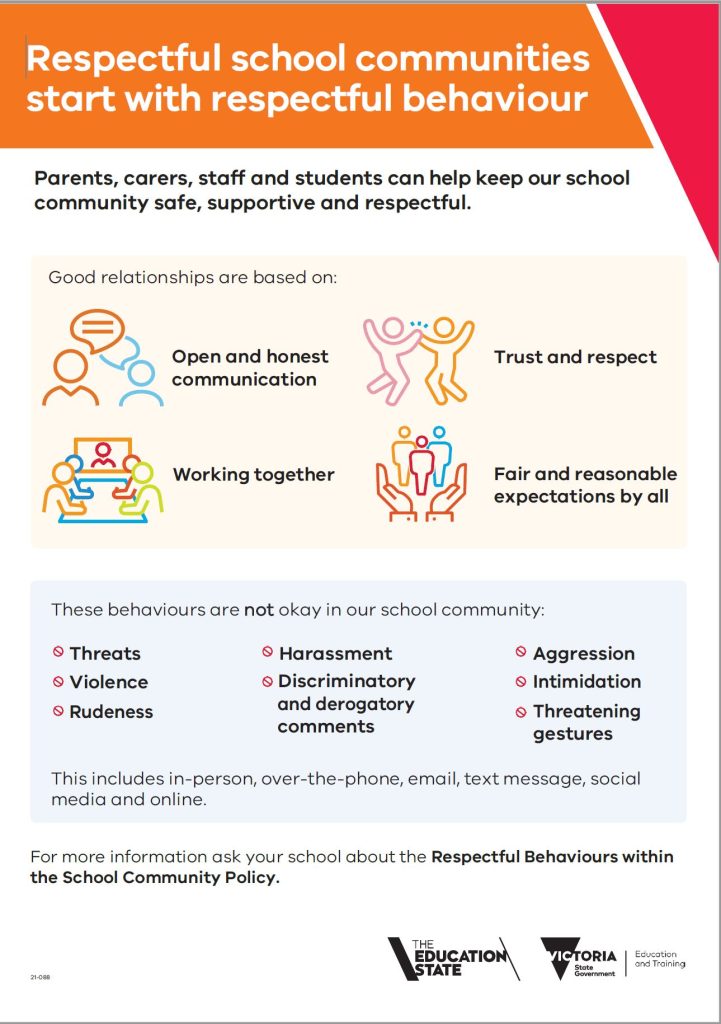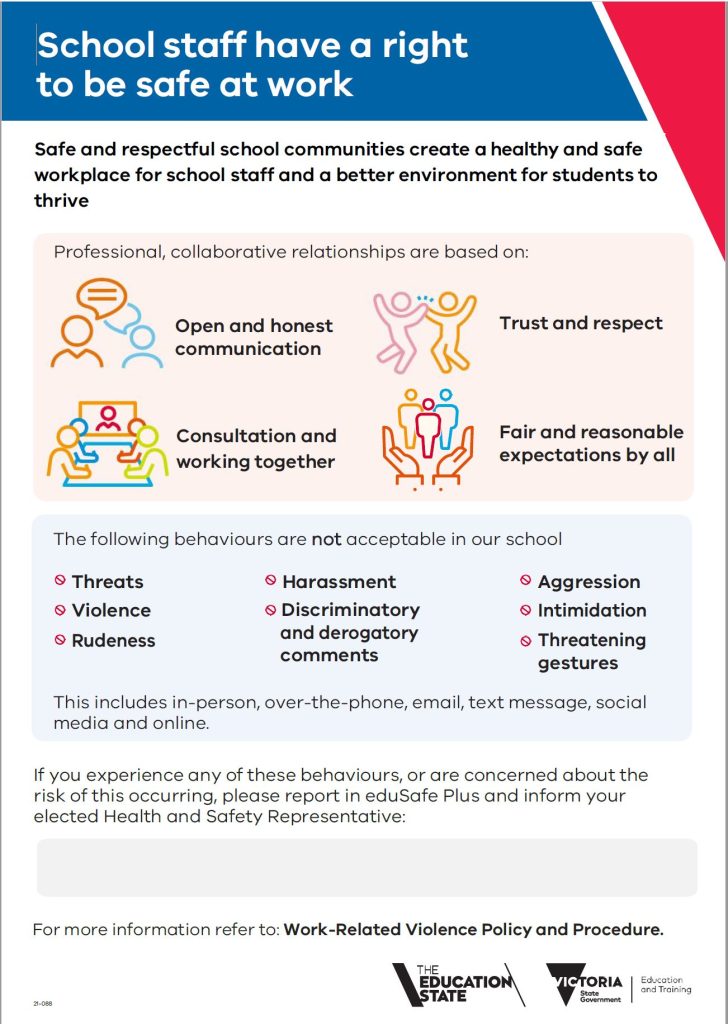مجتمع المدرسة الآمنة
السلوكيات المحترمة داخل المجتمع المدرسي
Craigieburn Secondary College respectful behaviours within the school community policy, training and rolled out. Everyone in the school community has a right to a safe and healthy learning environment and workplace.
As schools adjust to returning to a normal school and learning environment, with health and safety measures that prevent the spread of COVID-19, it’s important that adults and students in school communities continue to treat each other with respect and kindness.

No one should be threatened or intimidated at work or at school – that’s why the Department has created a set of clear expectations of behaviour to make schools safer for staff, students, and their families.
دائرة التعليم والتدريب 2022 السلوكيات المحترمة في سياسة المجتمع المدرسي يعزز أهمية العلاقات المحترمة والتعاونية بين الآباء ومقدمي الرعاية وموظفي المدرسة.
ويحدد مبادئ توجيهية واضحة حول معايير السلوك المتوقعة للآباء ومقدمي الرعاية وغيرهم من البالغين الذين يتفاعلون مع المجتمع المدرسي لتقليل مخاطر وحالات العنف المرتبط بالعمل تجاه موظفي المدرسة.
نشجع أعضاء مجتمع مدرستنا على أن يكونوا على دراية بنظام أوامر سلامة المجتمع المدرسي الذي تم وضعه بموجب البند 2.1A أمر وزاري من قانون إصلاح التعليم والتدريب لعام 2006 ، وسياسة تعزيز العلاقات الإيجابية والاحترام بين البالغين في مجتمعاتنا المدرسية وأن يكون لهم دور جيد نماذج لشبابنا.
النسخ المترجمة للملصق متاحة هنا:
عربي الآشورية اللغة التركية ساموا البنجابية هندي
بناء علاقة إيجابية مع مدرستك
الآباء / مقدمو الرعاية وموظفو المدرسة لديهم علاقة يمكن أن تستمر لسنوات عديدة. هذه فرصة للعمل معًا لإنشاء علاقة إيجابية تحقق مصالح الطفل الفضلى.
عندما تقوم هذه العلاقة على الاحترام والثقة ، يتعلم الطلاب بشكل أفضل ويشعرون أنهم ينتمون إلى المدرسة. يعتمد أساس العلاقة التعاونية الجيدة على:
- التواصل المفتوح والصادق
- الثقة والاحترام
- العمل سويا
- توقعات عادلة ومعقولة من قبل الجميع.
لفهم المزيد حول كيفية بناء اتصال إيجابي بمدرستك ، قم بالوصول إلى مشاركة الأسرة في التعلم الموارد.
المسؤولية المشتركة لأعضاء المجتمع المدرسي للتصرف باحترام
تعد البيئات المدرسية الإيجابية مهمة لأن لكل شخص الحق في أن يكون آمنًا وأن يلعب دورًا مشتركًا في الاحترام. يلعب كل شخص في المدرسة ، وخاصة الموظفين وأولياء الأمور / مقدمي الرعاية ، دورًا في جعل المدرسة مكانًا أفضل للتعلم والعمل.
السلوكيات المحترمة مهمة في بناء مجتمعات مدرسية قوية وصحية ومزدهرة.
يجب على موظفي المدارس في مدارس الحكومة الفيكتورية اتباع سياسة أماكن العمل المحترمة لبناء والحفاظ على مكان عمل محترم ، بما في ذلك:
- معاملة بعضنا البعض باحترام ومراعاة
- أن تكون شاملاً ، وتقدر الآخرين وتقبل اختلافاتهم
- الاعتراف بجهود وإنجازات الآخرين
- النظر في تأثيرنا على الآخرين
- استدعاء ومعالجة السلوك الذي يمكن أن يؤدي إلى التنمر والمضايقة والتمييز.
يمكن للوالدين / مقدمي الرعاية خلق بيئة إيجابية للتعلم والعمل من خلال:
- نمذجة السلوك الإيجابي لأطفالهم / أطفالهم والمجتمع المدرسي
- التواصل بأدب واحترام مع جميع أعضاء المجتمع المدرسي
- العمل مع المدرسة لتحقيق أفضل النتائج لأطفالهم / أطفالهم
- التواصل البناء مع المدرسة
- الاستفادة من العمليات والبروتوكولات المتوقعة عند إثارة المخاوف
- following the school’s processes for communication with staff and making complaints
- معاملة جميع موظفي المدرسة والطلاب وغيرهم من أعضاء المجتمع المدرسي باحترام.
من خلال معاملة الجميع باحترام ، يمكن للوالدين / مقدمي الرعاية والمدارس التأكد من شعور الطلاب بالدعم والرعاية.
 رفع الشكاوى باحترام في مدرستك
رفع الشكاوى باحترام في مدرستك
يدعم القسم حقك في تقديم شكوى ويقدم لك أ سياسة شكاوى أولياء الأمور لمساعدتك على القيام بذلك. تساعد الشكاوى المقدمة من أولياء الأمور ومقدمي الرعاية المجتمع المدرسي من خلال توفير التغذية الراجعة لتحسين كيفية عمل المدرسة.
ترحب المدارس بشكاوى الآباء ومقدمي الرعاية إذا تم التواصل معهم بطريقة محترمة وبناءة. قد يطلبون توصيل مخاوفهم كتابيًا.
ال مشاركة الأسرة في التعلم page shows parents and carers how they can best talk to schools to provide feedback or complaints. Each school is different in how they prefer to talk to you– please refer to your school’s guidance.
يمكنك الحصول على شخص داعم لمساعدتك في أي وقت ، يمكنه التحدث إلى المدرسة نيابة عنك أو مساعدتك في فهم سياسات المدرسة. يمكن أن يكونوا أحد أفراد العائلة أو صديقًا أو عضوًا في المجتمع أو شخصًا من خدمة الدعم.
يمكنك أيضًا أن تطلب من مدرستك مترجمًا أو مترجمًا للمساعدة في التواصل مع المدرسة ، وفقًا لـ سياسة خدمات الترجمة الشفوية.
For more information, refer to your school’s own complaints policy or the Department’s Parent Complaints Policy.
السلوكيات والنتائج غير المقبولة
Schools are positive places of learning where everyone has a right to a safe and healthy learning environment. Schools are also workplaces, and school staff deserve to work in an environment where they don’t feel threatened or unsafe.
عندما يتصرف عدد قليل من الآباء ومقدمي الرعاية بشكل غير مقبول تجاه أحد الموظفين أو أي عضو آخر في المجتمع المدرسي ، فقد يؤثر ذلك على صحتهم وسلامتهم ورفاههم. يمكن أيضًا أن يشعر المجتمع المدرسي الأوسع بالتأثير.
تشمل السلوكيات غير المقبولة أو غير المعقولة ، على سبيل المثال لا الحصر:
- being violent or threatening violence of any kind, including being physically intimidating, aggressive hand gestures or invading another person’s personal space
- التحدث أو التصرف بطريقة فظة أو عدوانية أو تهديدية ، إما شخصيًا أو عبر البريد الإلكتروني أو وسائل التواصل الاجتماعي أو عبر الهاتف
- إرسال رسائل أو رسائل بريد إلكتروني أو رسائل نصية متطلبة أو غير مهذبة أو مواجهة أو تهديدية
- التعليقات التمييزية أو المهينة
- استخدام وسائل التواصل الاجتماعي أو المنتديات العامة لإبداء ملاحظات غير مناسبة أو تهديدية بشأن المدرسة أو الموظفين أو الطلاب.
إذا تصرف أحد الوالدين أو مقدم الرعاية بطريقة غير مقبولة ، فيجوز لمدير المدرسة الاتصال بهم للتحدث عن هذا الأمر أكثر وقد تكون هناك عواقب. قد يشمل ذلك صنع ملف أمر سلامة المجتمع المدرسي لحظر أو تقييد السلوك الضار أو التهديد أو المسيء من أحد الوالدين أو مقدم الرعاية أو شخص بالغ آخر إلى أعضاء المجتمع المدرسي.
قد يتم تصعيد السلوك غير المقبول أو غير المعقول إلى الإدارة ، حيث سيتم تقييمه وإدارته من خلال:
- مطالبة الأطراف بحضور جلسات الوساطة أو المشورة
- طلب أن تكون جميع الاتصالات مكتوبة
- تحذيرات مكتوبة
- شروط الدخول إلى ساحات المدرسة أو الأنشطة المدرسية
- الاستبعاد من ساحات المدرسة أو الحضور في الأنشطة المدرسية
- تقارير لشرطة فيكتوريا
- إجراءات قانونية.
لمزيد من المعلومات حول هذه السياسة ، أرسل بريدًا إلكترونيًا safer.school.communities@education.vic.gov.au
يمكن العثور على معلومات إضافية في صفحة DET الخاصة بـ الآباء ومقدمي الرعاية
مصدر: قسم التعليم والتدريب (17 نوفمبر 2022). السلوكيات المحترمة في سياسة المجتمع المدرسي – All Rights Reserved
برنامج المدارس الآمنة
نحن ملتزمون باحترام بتوفير أماكن عمل وسياسات وخدمات آمنة وشاملة للطلاب والعاملين في مجتمعات LGBTIQ + وعائلاتهم. ال برنامج المدارس الآمنة يساعد المدارس على تعزيز بيئة آمنة داعمة وشاملة لطلاب LGBTIQ +.
معلومات اكثر
- Building a positive relationship with your child’s school page الذي يتضمن معلومات لمساعدتك على التأكد من أن طفلك يشعر بالدعم في مدرسته ، ودورك في ذلك.
- السلوكيات المحترمة داخل المجتمع المدرسي التي تحدد الأدوار المشتركة للآباء ومقدمي الرعاية وموظفي المدرسة في خلق بيئة إيجابية للتعلم.
- Looking after your child’s a resource containing guidance on how to help build and sustain your child’s wellbeing and keep a positive relationship with them.
- Looking after your child’s mental المعلومات والدعم لمساعدتك على رؤية العلامات المبكرة لمشاكل الصحة العقلية.
- Quick guide to supporting students with disability – resources for parents and carers للحصول على المعلومات الأساسية والإرشادات والموارد لدعم الطلاب ذوي الإعاقة.
- الأبوين for general parenting advice – 13 22 89
- وَرَاءَ for mental health support – 1300 22 4636
- فيكتوريا القانونية for free legal advice – 1300 792 387
مصدر: حكومة فيكتوريا. (18 نوفمبر 2022). معلومات للآباء ومقدمي الرعاية. حكومة فيكتوريا. (17 أغسطس 2022). مدارس آمنة – All Rights Reserved
Mobile Phone Policy and Use
As we continue to create calm, connected and safe learning environments, we are strengthening our approach to mobile phone use across the school from the beginning of Term 4. This aligns with the Victorian Department of Education’s Mobile Phones Policy, which requires that students switch off and securely store their mobile phones during the entire school day, including recess and lunch.
The policy is grounded in research showing that limiting phone use during school hours:
- Supports learning and focus by reducing distraction, improving engagement, and strengthening performance in learning outcomes
- Promotes wellbeing, social connectedness and school safety
- Encourages positive relationships, helping students to connect face-to-face and contribute to a culture of respect
- Decreases social conflict, exclusion and bullying
Educating for Change
We recognise that technology is part of our students’ world. Our focus is to educate, supporting young people to manage their relationship with devices in healthy, balanced ways.
In Term 4, 2025, we will engage students in a whole-school education program that includes:
- Year Level assemblies exploring how mobile phones impact learning and wellbeing
- Learning activities within our Form program
- Information for families on promoting positive digital habits at home
In-Class Process – Consistent and Fair
To ensure clarity and fairness, all staff will follow a consistent process when a student is observed with a phone in class.
1.Observation: A student is observed using or handling a phone (including AirPods or other linked devices) during class time.
2. Staff Action: The staff member requests that the student hand over the phone using calm and consistent language.
If compliant:
- The device is taken to the front office for secure storage.
- The confiscation is recorded on Compass.
- After three confiscations, a parent/guardian will be contacted to collect the phone. The student will then hand their phone in each morning for a period of one week.
If non-compliant:
- The teacher follows the Classroom Withdrawal Staged Response, aligned with our SWPBS framework, using calm, consistent language, allowing for take-up time conferencing to support compliance.
- If the student is withdrawn, the Mobile Phone Non-Compliance Staged Response commences.
In-Yard Process – Consistent and Fair
To ensure consistency across all areas of the school, the same expectations apply in the yard as in the classroom.
- Observation A student is observed using or handling a phone (including AirPods or other linked devices) while in the yard.
- Staff Action The staff member requests that the student hand over the phone using calm and consistent language.
If compliant:
- The device is taken to the front office for secure storage. The confiscation is recorded on Compass. After three confiscations, a parent/guardian will be contacted to collect the phone. The student will then hand their phone in each morning for a period of one week.
If non-compliant: A Refusal post is made on Compass.
ال Mobile Phone Non-Compliance Staged Response commences, following the same process as classroom non-compliance.
Mobile Phone Non-Compliance – Staged Response (Implemented from Term 4)
1.First Occasion – Class Withdrawal or Refusal in Yard
- Student withdrawn from class or refusal recorded in the yard.
- Year Level Team contacts home and documents the incident.
2. Second Occasion
- Student sent home with reflective work on the impact of phones on learning and wellbeing.
- Student hands in their phone each morning to the Year Level or Front Office for two weeks.
3.Third Occasion
- Suspension and a Parent/Carer Meeting.
- Student and family agree that, upon return, the phone will be handed in each morning for two weeks.
- Referral made to the Wellbeing Team for participation in the Mobile Phone Addiction Education Program. If a student fails to comply with this agreement, they will be sent home, and the matter may lead to further actions.
Our School Approach – Reflecting Our Values
Belonging: We create safe, inclusive learning spaces where everyone can connect without distraction.
Respect: We follow shared expectations that protect learning time and support each other’s right to focus.
Growth: We help students build independence, self-regulation and healthy digital habits for success beyond school.
Understanding: We recognise that changing habits takes time and support, and we work in partnership with families to guide students.
Together, through Belonging, Respect, Growth and Understanding, we can help our students stay present, connected and focused on their learning.
Please provide any feedback or concerns to the via or email James.mcgavisk@education.vic.gov.au by Friday 11th October.



